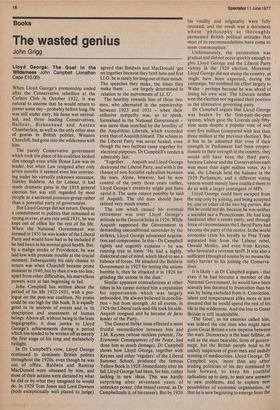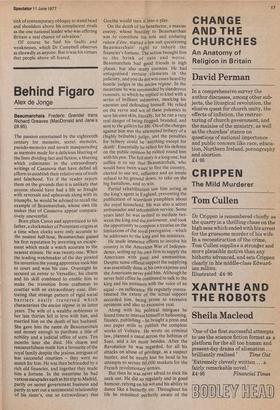Books
The wasted genius
John Grigg
Lloyd George: The Goat in the Wilderness John Campbell (Jonathan Cape £10.00) When Lloyd George's premiership ended after the Conservative rebellion at the Carlton Club in October 1922, it was natural to assume that he would return to power some day — probably before long. He was still under sixty, his fame was unrivalled, and three leading Conservatives, Balfour, Birkenhead and Austen Chamberlain, as well as the only other man of genius in British politics, Winston Churchill, had gone into the wilderness with him.
The purely Conservative government which took the place of his coalition looked dim enough even while Bonar Law was its leader, but when Law resigned after only seven months it seemed even less convincing under his virtually unknown successor, Stanley Baldwin. As for Labour, it had made dramatic gains in the 1918 general election but was still regarded by most people as a sectional pressure-group rather than a potential party of government.
But Lloyd George did not return. Despite a commitment to politics that remained as strong as ever, at any rate until 1931, he was kept out of office for the rest of his life. When the National Government was formed in 1931 he was leader of the Liberal Party and would have had to be included if he had been in his normal good health. But, by a malign stroke of Providence, he was laid low with prostate trouble at the crucial moment. Subsequently his only chance to return was when Churchill became prime minister in 1940, but by then it was too late; apart from other difficulties, his marvellous powers were at last beginning to fail.
John Campbell has written about the period of his life 1922-1931, with a prologue on the post-war coalition. No praise could be too high for this book. It is equally good in its analysis of events and in its description and assessment of human beings. Above all, without being in the least hagiographic, it does justice to Lloyd George's achievements during a period which has tended to be written off as merely the first stage of his long and melancholy twilight.
In Dr Campbell's view, Lloyd George continued to dominate British politics throughout the 1920s, even though he was out of office. Baldwin and Ramsay MacDonald were obsessed by him, and most of their actions were dictated by what he did or by what they imagined he would do. In 1929 Tom Jones and Lord Dawson (both exceptionally well placed to judge) agreed that Baldwin and MacDonald 'got on together because they both hate and feat Ll.G, he is rarely for long out of their minds. The speeches they make, the times they make them . . . are largely determined in relation to the movements of Ll. G'.
The hostility towards him of these two men, who alternated in the premiership between 1923 and 1931 — when their collusive sympathy was, so to speak, formalised in the National Government — was more than matched by the hostility of the Asquithian Liberals, which exceeded even that of Asquith himself. The schism in the Liberal Party was never healed, even though the two factions came together for electoral purposes. Dr Campbell's verdict is admirably fair: 'Together. . . Asquith and Lloyd George destroyed the Liberal Party, and with it the chance of non-Socialist radicalism between the wars. Alone, however, had he won control of the party three years earlier, Lloyd George's creativity might just have saved it. The same cannot possibly be said of Asquith. The old man should have retired very much sooner.'
The row which caused his eventual retirement was over Lloyd George's attitude to the General Stike in 1926. While Asquith supported the Government in demanding unconditional surrender by the strikers, Lloyd George advocated negotiation and compromise. In this — Dr Campbell rightly and cogently explains — he was running true to form: 'He had a highly, dialectical cast of mind, which liked to see a balance of forces. He attacked the Baldwin Government in 1925 for letting the unions humble it, then he attacked it in 1926 for grinding the unions in the dust.'
Similar apparent contradictions at other times in his career earned him a reputation for opportunism which was largely unfounded. He always believed in conciliation — but from strength. At all events, in 1926 the Liberal rank-and-file took his side. Asquith resigned and he became de facto leader of the Party.
The General Strike issue effected a most fruitful reconciliation between him and J.M. Keynes (whose reckless polemic, The Economic Consequences of the Peace, had done him so much damage). Dr Campbell shows how Lloyd George, together with Keynes and other 'regulars' of the Liberal Summer School, produced the famous Yellow Book in 1928. Immediately after his fall Lloyd George had been, for him, rather lacking in new ideas. This was hardly surprising after seventeen years of unbroken power. (the massif central, as Dr Campbellcalls it, of his career). But by 1926
his vitality and originality were fully restored, and the result was a document whose 'philosophy so thoroughly permeated British political attitudes that most of its recommendations have come to seem commonplace.'
Unfortunately, the permeation was gradual and did not occur quickly enough to give Lloyd George and the Liberal Party victory in the 1929 election. Moreover Lloyd George did not stump the country, as might have been expected, during the campaign, but confined his effort largely to Wales — perhaps because he was afraid of losing his own seat. The Liberals neither won the election nor regained their position as the alternative governing party.
Dr Campbell argues that Lloyd George was beaten by the first-past-the-post system, which gave the Liverals only fiftynine seats despite a popular vote of well over five million (compared with less than three million at the previous election). But it has to be admitted that even if their strength in Parliament had been proportionate to their strength in the country, they would still have been the third party, because Labour and the Conservatives each won more than eight million votes. As it was, the Liberals held the balance in the 1929 Parliament, and a different voting system would merely have enabled them to do so with a larger contingent of MPs.
Lloyd George could have escaped from the trap only by joining, and being accepted by, one or other of the two big parties. But this he could not do, because he was neither a socialist nor a Protectionist. He had long hankered after a centre party, and through force of circumstances the Liberal Party had become the party of the centre. In the world economic crisis his loyalty to Free Trade separated him from the Labour rebel, Oswald Mosley, and even from Keynes, who favoured a revenue tariff. It was also a sufficient (though of course by no means the only) barrier to his joining the Conservatives.
It is likely — as Dr Campbell argues — that even if he had become a member of the National Government, he would have been scarcely less doomed to frustration than he was by being excluded from it. Conviction, talent and temperament alike more or less ensured that he would spend the rest of his life in the wilderness. And the loss to Great Britain is still incalculable.
'The Goat', as his enemies called him, was indeed the one man who might have given Great Britain a new impetus between the wars. Democracy is the least fallible, as well as the most bearable, form of governmept, but the British people tend to be unduly suspicious of great men and unduly trusting of mediocrities. Lloyd George, Dr Campbell says, 'more than any other leading politician of his day continued to look forward, to keep his youthful radicalism up to date, to seek new answers to new problems, and to explore new possibilities of economic organisation, so that he is now beginning to emerge from the sink of contemporary obloquy to stand head and shoulders above his complacent rivals as the one national leader who was offering Britain a real chance of salvation.'
Of course he had his faults and weaknesses, which Dr Campbell observes as shrewdly as anyone. But it was his virtues that people above all feared.



































 Previous page
Previous page